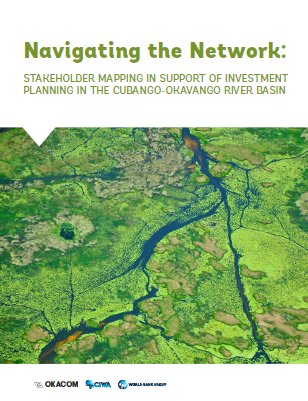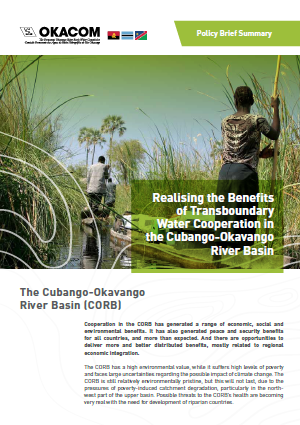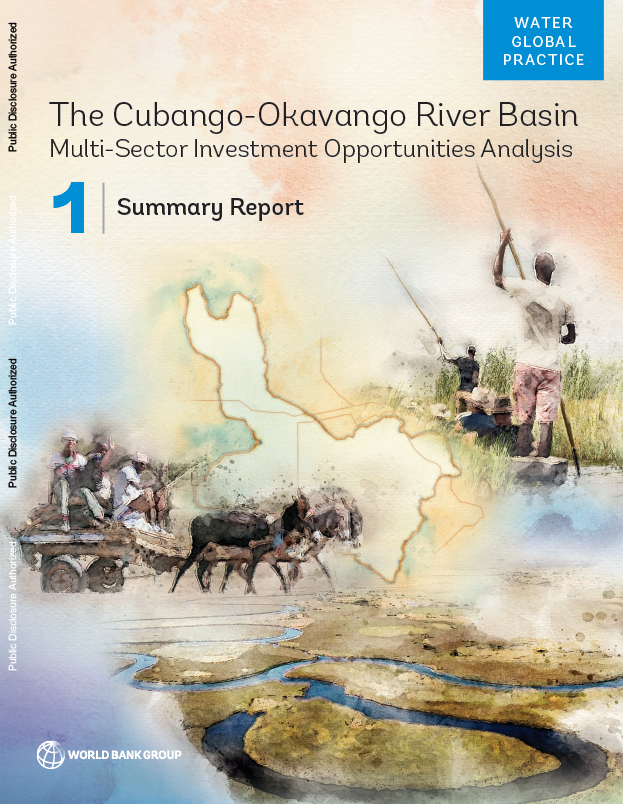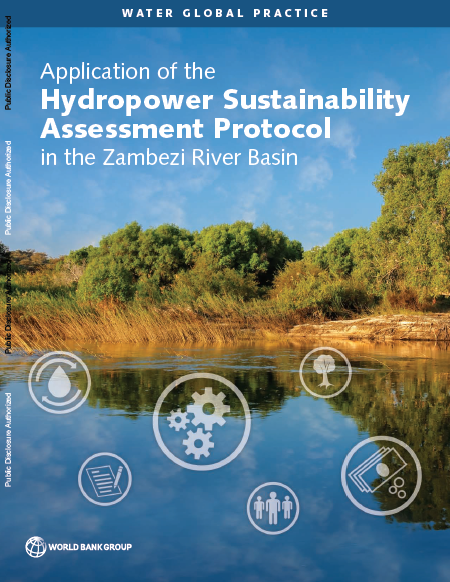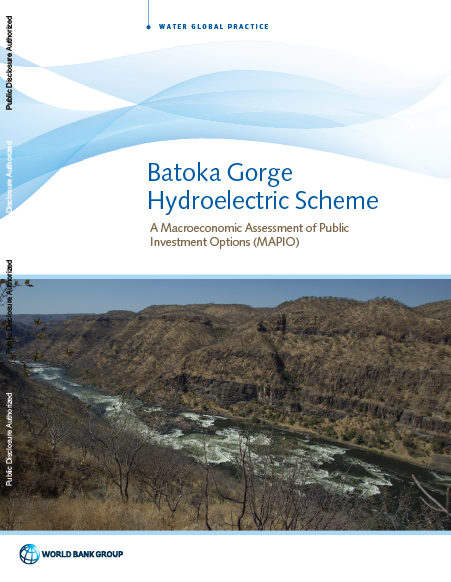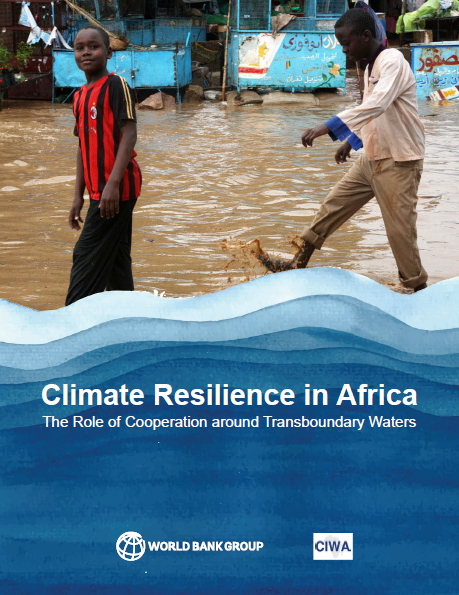Navigating the Network: Stakeholder Mapping in Support of Investment Planning in the Cubango-Okavango River Basin
The Cubango-Okavango River is one of the world’s most unique, near pristine free-flowing rivers and central to sustainable economic development within the arid landscapes of the basin. In 1994, Angola, Botswana, and Namibia established the Permanent Okavango River Basin Water Commission (OKACOM) to promote coordinated and sustainable water resources management while addressing the social and economic needs of the Member States.
The Multi-Sector Investment Opportunities Analysis (MSIOA) is part of a systematic strategy by OKACOM to assist the Member States to achieve socially just, economically prosperous, and environmentally healthy development of the Cubango-Okavango River Basin.
Authors: CIWA, World Bank, OKACOM
Realising the Benefits of Transboundary Water Cooperation in the Cubango-Okavango River Basin
The Cubango-Okavango River is one of the world’s most unique, near pristine free-flowing rivers and central to sustainable economic development within the arid landscapes of the basin. In 1994, Angola, Botswana, and Namibia established the Permanent Okavango River Basin Water Commission (OKACOM) to promote coordinated and sustainable water resources management while addressing the social and economic needs of the Member States.
The Multi-Sector Investment Opportunities Analysis (MSIOA) is part of a systematic strategy by OKACOM to assist the Member States to achieve socially just, economically prosperous, and environmentally healthy development of the Cubango-Okavango River Basin.
Authors: CIWA, World Bank, OKACOM
Addressing Poverty Through Multi-Sector Investments in the Cubango-Okavango River Basin
The Cubango-Okavango River is one of the world’s most unique, near pristine free-flowing rivers and central to sustainable economic development within the arid landscapes of the basin. In 1994, Angola, Botswana, and Namibia established the Permanent Okavango River Basin Water Commission (OKACOM) to promote coordinated and sustainable water resources management while addressing the social and economic needs of the Member States.
The Multi-Sector Investment Opportunities Analysis (MSIOA) is part of a systematic strategy by OKACOM to assist the Member States to achieve socially just, economically prosperous, and environmentally healthy development of the Cubango-Okavango River Basin.
Authors: CIWA, World Bank, OKACOM
The Cubango-Okavango River Basin Multi-Sector Investment Opportunities Analysis
The Cubango-Okavango River is one of the world’s most unique, near pristine free-flowing rivers and central to sustainable economic development within the arid landscapes of the basin. In 1994, Angola, Botswana, and Namibia established the Permanent Okavango River Basin Water Commission (OKACOM) to promote coordinated and sustainable water resources management while addressing the social and economic needs of the Member States.
The Multi-Sector Investment Opportunities Analysis (MSIOA) is part of a systematic strategy by OKACOM to assist the Member States to achieve socially just, economically prosperous, and environmentally healthy development of the Cubango-Okavango River Basin.
Authors: CIWA, World Bank, OKACOM
Rapport annuel de CIWA pour 2019 (en anglais)
Dans ce rapport annuel 2019, le programme de Coopération pour les eaux internationales en Afrique (CIWA) examine les progrès accomplis pour relever les défis auxquels l'Afrique est confrontée aujourd'hui.
Application of the Hydropower Sustainability Assessment Protocol in the Zambezi River Basin
The objective of the technical assistance program on the “Application of the Hydropower Sustainability Assessment Protocol in the Zambezi River Basin” was to assist the Riparian States in development and utilization of the hydropower potential of the basin in a sustainable and responsible way. The Hydropower Sustainability Assessment Protocol is a methodology for measuring sustainability of hydropower projects across a range of more than 20 environmental, social, technical, and business topics. The program sought to promote the development and use of the Protocol as a guiding framework for sustainability that can help balance mutual dependencies among different water users across the basin. This was implemented in collaboration with the members of Zambezi River Basin Water Resources Managers and Dam Operators (ZAMDO) and in coordination with the Zambezi Watercourse Commission as part of a broader program of support in the basin.
Author: CIWA, World Bank
Batoka Gorge Hydro Electricity Scheme. A Macroeconomic Assessment of Public Investment Options (MAPIO)
Maximizing the benefits from investment in hydropower requires a clear, predictable, and transparent process informed by robust analyses that can facilitate a multicriteria consideration of the range of options and alternatives that may be available. The upstream tools available to governments to assess the costs and benefits of different investment strategies are often too general or specific to determine the optimal investment strategy. This paper outlines a simple model to assess the returns of a potential investment program in the hydropower sector. The Macroeconomic Assessment of Public Investment Options
(MAPIO) model provides an analysis of impacts on key macroeconomic variables, such as exports, imports, gross domestic product (GDP), prices, and fiscal accounts.
Author: CIWA, World Bank
Rapport annuel de CIWA pour 2018 (en anglais)
Ce rapport annuel décrit comment le soutien de CIWA a aidé les clients à partager des informations et à approfondir leur collaboration. En collaboration avec ses clients, CIWA apprend, s'améliore et découvre en permanence de nouvelles façons d'assurer une croissance durable, inclusive et résiliente au climat.
Fouta Djallon Water Atlas
The Fouta Djallon Water Resources Atlas is a monographic synthesis of the Fouta Djallon highland, the water tower of West Africa, which aims to provide a comprehensive picture of both its physical components and its water resources, including their uses and the roles they play – more specifically their environmental roles.
Authors: Wilson Babatundé, Dédéou Mahamane, Bazoun,Janvier, Fraval Pierrick, Bea Sylvestre, Davy Thierry, Moutouama Fidele Tchossi
Climate Resilience in Africa: The Role of Cooperation around Transboundary Waters
This report draws attention to the critical role of transboundary water cooperation for adapting to climate change in Africa. The report provides a conceptual framework for understanding the links between climate change, socioeconomic development, water resources, and transboundary cooperation in Africa, as well as some examples of successful practices to date.
Authors: Jacqueline Tront, Jonathan S. Kamkwalala, Nagaraja Rao Harshadeep, Anjali Lohani, Irene Rehberger Bescos & Andrew Tanabe



